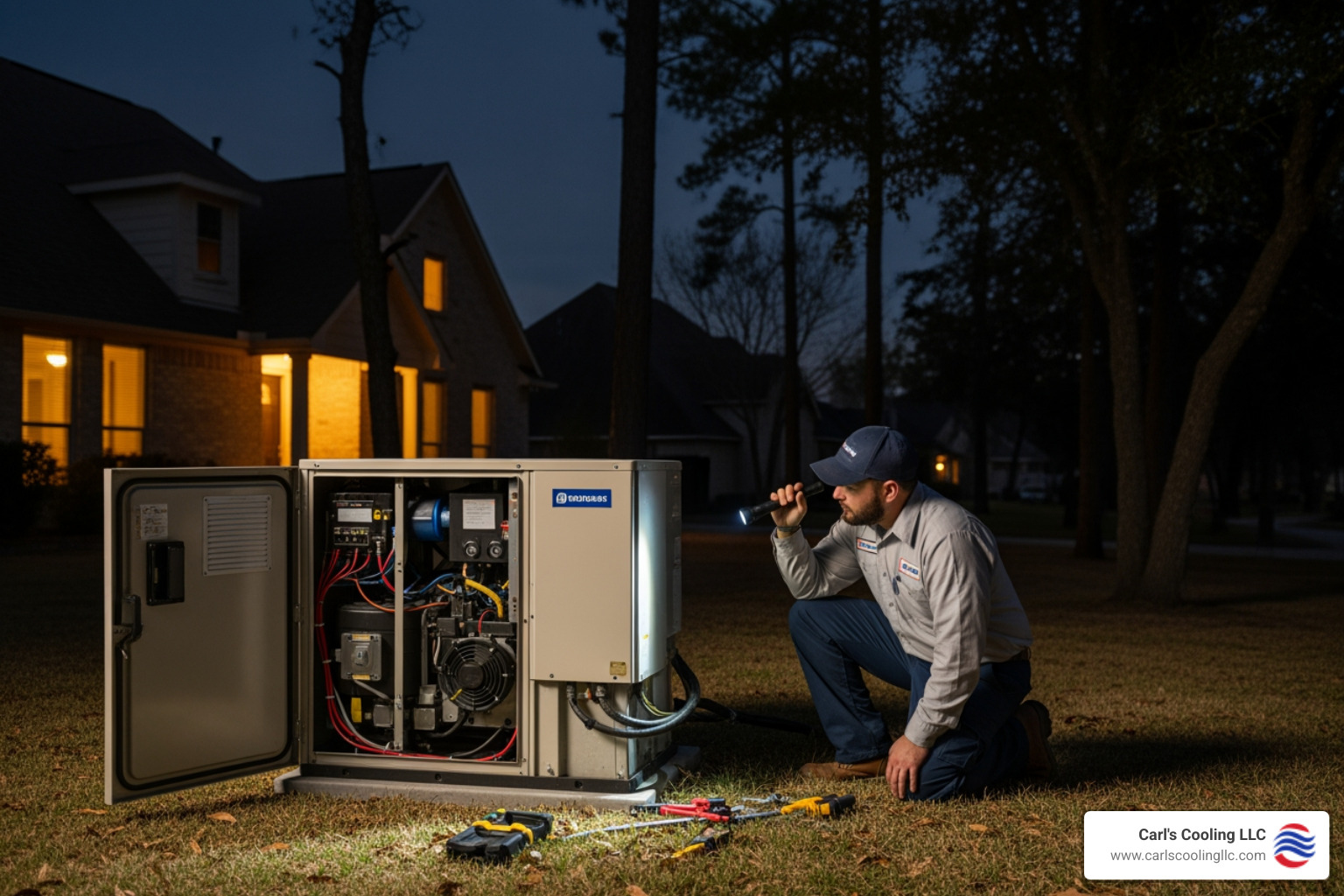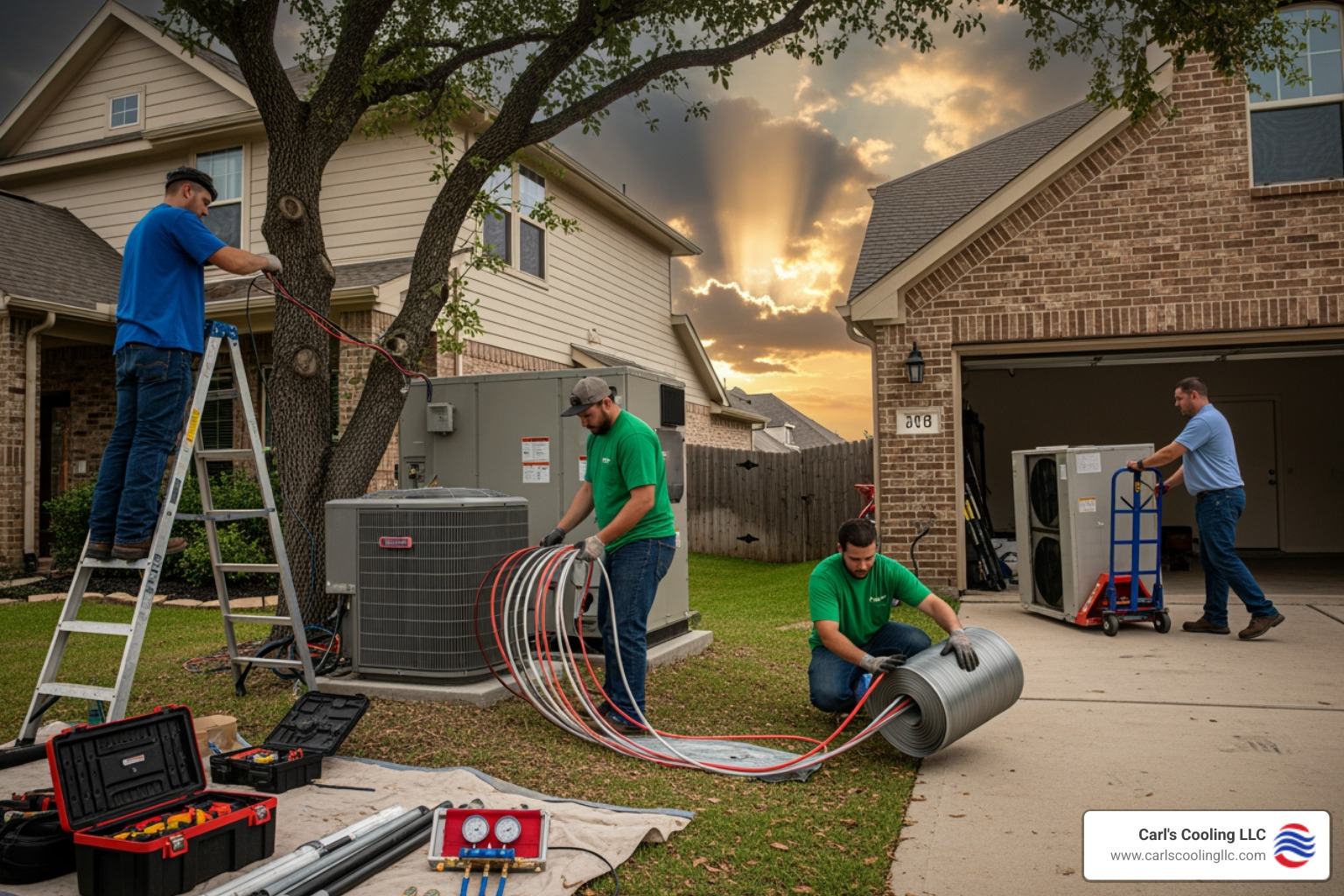When an air conditioner in Montgomery starts leaking water, it can quickly go from a small inconvenience to a serious issue. Excess moisture around the system may seem minor, but over time, it can lead to drywall damage, weakened flooring, or even mold. Most people first notice a puddle of water near their indoor unit and might not realize their AC system is under stress or starting to fail.
Summers in Montgomery can be long and humid. A reliable AC system is needed to maintain comfort and protect indoor air quality. When water leakage begins, it doesn’t just point to excess condensation. It often signals a hidden problem that should be corrected right away to avoid bigger complications later. Understanding why this problem happens helps prevent ongoing damage and helps catch failures early before they get worse.
Common Causes of AC Leaks in Montgomery
Water leaks from an AC unit usually result from a blockage, mechanical damage, or poor airflow. While water is a normal part of the cooling process, it is supposed to move out of the home through a drainage system. When something interrupts that process, leaks occur. Several common issues may be behind your leaking AC in Montgomery:
1. Blocked Condensate Drain Line
This is one of the most frequent causes of AC leaks. Dirt, dust, and other debris can clog the condensate line, causing water to back up and overflow into your home.
2. Frozen Evaporator Coils
If the evaporator coils freeze, they will eventually thaw and release more water than the drain pan can handle. Coils can freeze due to low airflow, dirty filters, or refrigerant issues.
3. Low Refrigerant Levels
When refrigerant is low, pressure inside the AC drops. This causes the coils to freeze, and as they melt, the drain system struggles to keep up, resulting in excessive water leakage.
4. Dirty Air Filters
A clogged filter restricts airflow, forcing the system to work harder. Dirty filters often lead to frozen coils, and again, the thawing process produces more water than the system can drain away.
5. Broken or Damaged Drain Pan
The drain pan under your unit collects the moisture as it exits the system. If the pan is cracked or rusted through, that water ends up on your floor instead of the drain line.
Each of these problems can harm not just your AC unit but the space around it too. For example, a family in Montgomery noticed water soaking into their hallway carpet over several days, only to discover the issue came from a tear in the drain pan of their aging system. By the time they spotted the source, the damage had already reached the baseboards.
Signs Your AC Is Leaking Water
Water near the unit may be the most obvious indicator of a leak, but sometimes the signs are subtle. If you are concerned your air conditioning system might be leaking water, watch out for the following symptoms:
- Visible Water or Damp Spots: Puddles around the indoor unit or wet patches on nearby carpets, flooring, or walls suggest that the drainage system is not working properly.
- Odd Dripping Sounds: Consistent dripping that cannot be linked to roof leaks or plumbing may be coming from your AC system.
- Higher Indoor Humidity: If your home feels damp even when the AC is running, it could mean the system is not draining moisture correctly.
- Musty Smells or Mold Growth: Moisture build-up creates the perfect environment for mold. If areas near your AC start smelling musty or mildew-like, the water leak may have been going on for a while.
Recognizing these signs early can help minimize damage and make professional repairs more effective. If left ignored, a small amount of leaking water can escalate into larger household problems like mold or structural weakening. Each sign points to a possible failure somewhere in the system, and responding quickly helps keep the unit running smoothly and safely.
Steps to Take If Your AC Is Leaking
When water starts collecting around your AC unit, the most important step is to act quickly. Delays can lead to water damage, increased stress on the system, and musty smells that are hard to get rid of. Knowing what to do when you see or hear signs of a leak helps limit damage and protects your home’s air conditioning system.
Here is what you should do if your AC is leaking in Montgomery:
1. Turn Off the AC Unit
Start by switching off the system at the thermostat. This minimizes further damage from water and keeps the unit from working harder while something is wrong.
2. Check the Air Filter
A dirty air filter restricts airflow and can contribute to frozen coils. If it looks clogged, replacing it can help improve the efficiency of your system and reduce the chance of another leak.
3. Inspect the Drain Line for Visible Blockages
If you can access the drain line and see buildup or mold at the opening, it is a sign that a clog might be stopping moisture from leaving the system. A clear drain line helps prevent overflow.
4. Call Our Professionals
If there is standing water, regular leaks, or signs of mold, it is time for a full system inspection. Our technicians have the tools, experience, and training to find the exact issue and safely fix it before it turns into a bigger problem.
These steps are meant to stop further moisture damage and rule out surface-level issues. But since AC systems are complex, hidden problems like low refrigerant or cracked components require professional service to resolve fully.
Preventing Future Water Leaks
Once the leak is handled, it is smart to think ahead. Many water leaks could have been avoided with basic inspection and service. Keeping your system clean and in good working order can catch issues before they lead to water damage.
Prevent future problems by sticking to these practices:
- Schedule regular maintenance with a professional technician to inspect the drain line, evaporator coil, and refrigerant levels.
- Change or clean air filters every one to three months depending on your indoor environment and usage.
- Keep the area around the indoor unit clean and clear so moisture does not collect in hidden areas.
- Watch out for changes in indoor humidity or airflow as they can be early signs of performance problems.
- Ask your technician to inspect the drain pan for wear and tear during each maintenance visit.
A well-maintained system not only lasts longer but also provides better indoor comfort when temperatures rise in Montgomery.
Ensuring Long-Term AC Performance in Montgomery
Dealing with a leaking AC can be frustrating, especially when it leads to indoor humidity, discomfort, or property damage. Small problems like blocked lines or dirty filters may seem minor, but they can create a chain reaction that reduces performance and shortens equipment life. Staying alert to signs like puddles, strange odors, or poor airflow gives you enough early warning to get help before bigger issues develop.
Timely AC repairs help protect your home and improve system efficiency. Quick action lowers the risk of mold, keeps humidity in check, and maintains cooling performance when it matters most. When your AC starts to leak, even a little, it is best to rely on expert care to correct the issue the right way. For residents in Montgomery, preventing and fixing AC leaks is key to a more comfortable, hassle-free summer.
If you are encountering water leaks or other AC issues in your home, turn to the experienced team at Carl's Quality Cooling and Heating LLC for dependable service and long-term solutions. Our experts are ready to deliver timely and professional AC repair in Montgomery to keep your system operating at its best and your indoor environment dry and comfortable. For a quick estimate or to book a service visit, please contact us today.






